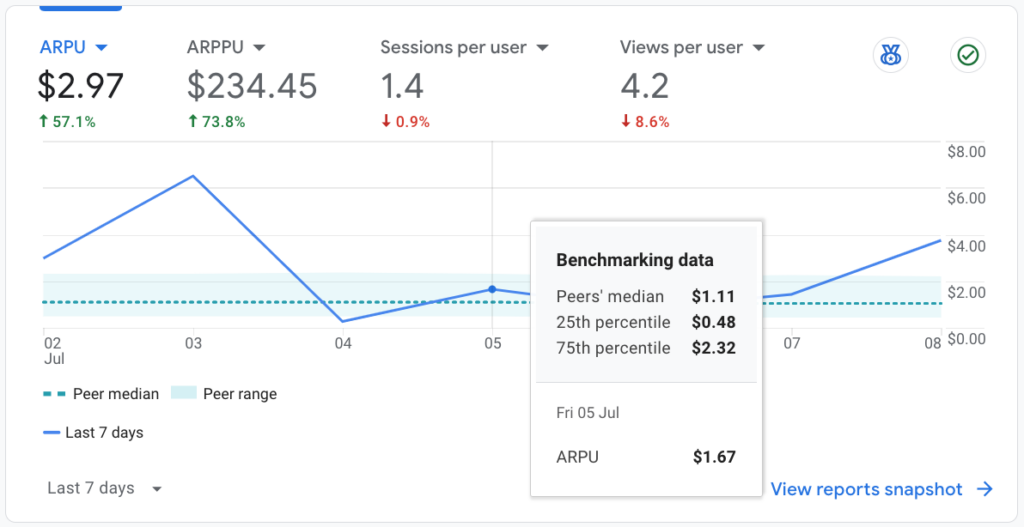Google Analytics 4 (GA4) just got a serious upgrade with its new benchmarking features, letting businesses size up their performance against industry rivals.
The new functionality represents a major advancement for marketers and analysts, providing invaluable context that can help shape more informed strategic decisions.
Benchmarking Unleashed: Your Secret Weapon in Analytics
Benchmarking is a powerful tool that enables businesses to gauge their performance against others in their industry. It provides a reference point to understand how well your business is performing in key areas like user acquisition, engagement, retention, and monetisation. By comparing your metrics to those of similar businesses, it becomes easier to identify trends, spot potential weaknesses, and capitalise on strengths.
Google Analytics 4 offers benchmarks based on peer groups—cohorts of businesses that share similar characteristics, such as industry verticals or other relevant details. These peer groups are instrumental in delivering accurate comparisons, allowing businesses to make data-driven decisions with confidence.
Inside GA4 Benchmarking: How It All Works
To access benchmarking data in GA4, your property must have the “Modelling contributions & business insights” setting enabled in the Admin > Account Settings section. Once this setting is activated, GA4 will provide benchmarks that are refreshed every 24 hours, ensuring you have up-to-date information to guide your strategies.
The benchmarking data is available for a wide range of metrics, covering acquisition, engagement, retention, and monetisation. For example, you can compare your “New User Rate” to that of your peers to see if you are effectively attracting new customers. Alternatively, examining your “Average Revenue per User” (ARPU) will help you assess whether your monetisation strategies are on par with industry standards.
Customise, Compare, Conquer: The Key Features of GA4 Benchmarking
One of the standout features of GA4’s benchmarking is the ability to customise your peer group. A variety of categories are available, allowing you to find the most relevant comparison group for your business. Whether you operate in Arts & Entertainment, Shopping, or Travel & Transportation, GA4 provides the flexibility to ensure your comparisons are meaningful.
Data privacy is also a top priority for Google. All benchmarking data is encrypted, protected, and aggregated to maintain privacy. Additionally, GA4 ensures that a minimum number of properties are included before benchmarks become available to a peer group, safeguarding the integrity and accuracy of the data.
Another important aspect of GA4 benchmarking is the visualisation of your data. When benchmarking is enabled, the overview card in your GA4 property displays your trendline, the median in your peer group, and the range within your peer group (25th to 75th percentile). This visual representation makes it easy to see how your business compares to others and quickly identify any outliers or trends that require attention.
Benchmarking in Action: Real-World Applications of GA4 Insight
GA4 benchmarking can be leveraged in numerous ways to enhance your business strategies. Here are a few examples:
- Acquisition: New User Rate
- Peer Group: Shopping > Apparel
- Scenario: Your “New User Rate” is consistently below the 25th percentile of your peer group.
- Insight: The lower acquisition of new users compared to similar businesses suggests a need for improvement.
- Action: Increasing investment in user acquisition strategies, such as targeted advertising, social media campaigns, or content marketing, could help improve this metric.
- Engagement: Average Engagement Time per Session
- Peer Group: Arts & Entertainment
- Scenario: Your “Average Engagement Time per Session” is significantly higher than the 75th percentile of your peer group.
- Insight: Users are spending more time interacting with your content compared to most of your peers.
- Action: Capitalising on this high engagement by introducing strategies to increase conversions, such as strategically placed calls-to-action or personalised recommendations, can drive further success.
- Retention: Bounce Rate
- Peer Group: Travel & Transportation
- Scenario: Your “Bounce Rate” is notably higher than the median of your peer group.
- Insight: A larger proportion of users are leaving your site after viewing only one page compared to similar businesses.
- Action: Investigating the reasons for this high bounce rate and improving your site’s user experience, ensuring relevant content is easily accessible, or optimising your landing pages are potential solutions.
- Monetisation: ARPU (Average Revenue per User)
- Peer Group: Food & Drink
- Scenario: Your “ARPU” is trending below the 25th percentile of your peer group.
- Insight: The lower revenue per user compared to most similar businesses indicates an opportunity for improvement.
- Action: Exploring strategies to increase ARPU, such as upselling, cross-selling, loyalty programmes, or personalised offers, can help boost revenue.
These examples illustrate how GA4 benchmarking can provide actionable insights that drive growth. By understanding how your performance compares to your industry peers, you can identify areas of strength and opportunities for improvement, ultimately helping you achieve your business objectives.
The Future of Analytics with GA4
The introduction of benchmarking in GA4 marks a new era in digital analytics. A long-standing need in the analytics community for comparative data is addressed by this update, allowing businesses to gauge their performance more accurately within their industry context. As more businesses adopt GA4 and begin using these benchmarks, the quality and relevance of the data will only improve, making it an essential tool for any business looking to stay competitive in their industry.
Exploring this new feature in your GA4 account and considering how it can enhance your analytics insights is strongly encouraged. Regularly reviewing benchmarking data and making data-driven decisions will help businesses stay ahead of the curve and drive continuous improvement in their performance.




RECOMMENDED FOR YOU
Google Rebuilds Checkout For AI Shopping
Agentic shopping has moved from theory to reality, and…
Agentic shopping has moved from theory to reality, and…
Google AI To Power Apple’s Siri
Apple has officially teamed up with Google in a…
Apple has officially teamed up with Google in a…
Google’s Nano Banana AI App Fuels Growth
Google’s latest AI success story is not a productivity…
Google’s latest AI success story is not a productivity…